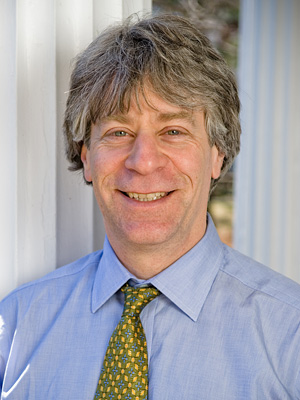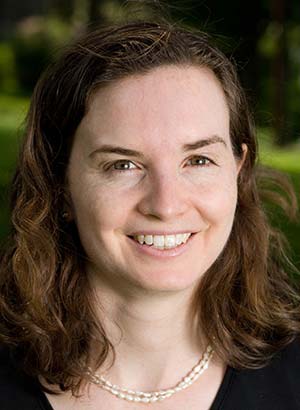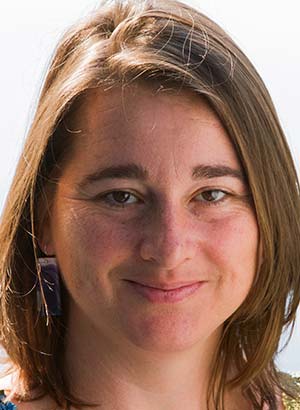Four Amherst professors have been honored among the country’s most creative thinkers with grants to further their research.
The Carnegie Corporation of New York named Lawrence Douglas, James J. Grosfeld Professor of Law, Jurisprudence and Social Thought, and Katharine Sims, assistant professor of economics, two of among only 33 Andrew Carnegie Fellows from colleges and universities across the nation.
Only one other institution in the country besides Amherst is represented by two scholars.
“I’m honored, greatly pleased, and not a little surprised,” said Douglas.
The Carnegie program supports scholars in the social sciences and humanities by enabling them to devote between one and two years to research and writing. The anticipated result of each fellowship—which carries with it up to $200,000 in funding—is the publication of a book or major study.
Douglas will use his fellowship to continue his groundbreaking exploration of the law and human rights, while Sims will use hers to better understand the intersection of economic and environmental policies in four countries.
Douglas and Sims aren’t the only Amherst faculty members to receive prestigious awards recently.
Colleagues Amity Gaige, visiting writer, was named a Guggenheim Fellow, and Lisa Brooks, associate professor of English and American studies, was awarded a Whiting Public Engagement Fellowship.
What follows is an overview of the three honors.
Carnegie Fellowships
The process for choosing Carnegie fellows is a particularly rigorous one.
Recipients were selected based on the originality, promise and potential impact of their proposals. They were chosen by a distinguished panel of 16 jurors that included heads of the country’s premier scholarly institutions and presidents of leading universities and foundations.

Douglas’ application centered on a book he is currently writing. Tentatively titled The Jurisprudence of Atrocity, the scholarly work aims to present a “synthetic understanding” of law’s response to the worst human rights violations.
The book will focus on the core of Douglas’ “atrocity paradigm”: Nazi crimes and the modern examples of ethnic cleansing in the Balkans and genocide in Rwanda.
Those human rights violations “stand as the gravest offenses recognized by law; and bringing their perpetrators to justice is accepted as a universal legal good,” he explained in his proposal. “Yet more than simply an outgrowth of conventional criminal law, the atrocity paradigm, I argue, has so transformed prosecutorial theories and practices as to constitute a field onto itself, controlled by its own logic and methods.”
Douglas hopes the book will “contribute to a vital ongoing debate about the role that law can play in responding to the most radical attacks on groups and collective identity.”
An expert in the field of war crimes trials, Douglas has published extensively on the topic. His most recent book is The Right Wrong Man: John Demjanjuk and the Last Great Nazi War Crimes Trial, an extension of a lengthy, in-depth article he wrote for Harper’s Magazine in March 2012.

Sims’ project, “Balancing Land Conservation and Development in the Long Term,” will explore the tensions between environmental and economic policies in Mexico, Thailand, Nepal and New England.
Her goal is to help national and international policymakers track and manage both changes in local economies and land-use development.
She plans to work with national statistical agencies, conservation organizations and scientists who monitor global ecosystems. She will also begin analyzing multiple conservation and economic policies in each of the aforementioned locations, drawing on data from 1990-2015 and building on her previous work.
“Long-term monitoring systems and analysis can be achieved at low cost by connecting existing data collection systems,” she wrote in her proposal. “They could also be a key part of adaptive management solutions to effectively balance global conservation and local development in the long term.”
Sims’ research uses microeconomic theory and econometric tools to study how land conservation policies affect both environmental and economic outcomes in various locations around the world. Some such policies have involved protected areas, payments for ecosystem services and local zoning.
Guggenheim Fellowship

Gaige can count herself among a diverse group of 178 scholars, artists and scientists chosen from among 3,000 applicants to receive a Guggenheim Fellowship this year. The acclaimed novelist was chosen in the fiction category.
The variety of backgrounds, fields of study and accomplishments of Guggenheim Fellows is a hallmark of the John Simon Guggenheim Memorial Foundation program. In all, 50 scholarly disciplines and artistic fields, 71 different academic institutions, 27 states and the District of Columbia and two Canadian provinces are represented by this year’s fellows.
Gaige said she hopes to give her writing “the kind of sustained attention that is required to metamorphose an idea into a [new] novel” during her fellowship period. “I’m inspired and certainly fretful, but, overall, curious about what I might discover,” she said.
In discussing the honor, she gave a nod to Amherst: “I have been sustained by this place and by my unparalleled and unforgettable students and colleagues.”
Gaige is the author of three books, O My Darling, The Folded World, and Schroder. Since its publication, Schroder has been translated into 18 languages, shortlisted for UK’s The Folio Prize in 2014 and named one of Best Books of 2013 by The New York Times Book Review, Washington Post, The Wall Street Journal, Kirkus and Publisher’s Weekly, among others.
Whiting Public Engagement Fellowship

Brooks was awarded a Whiting Public Engagement Fellowship. Only seven other scholars in the country were chosen for the honor.
This fellowship of $40,000 is meant to fund six consecutive months of leave for work on an ambitious, public-facing humanities project. An additional stipend of up to $10,000 will be made available to cover project costs, such as travel, collaboration, technology and training.
Approximately 40 colleges and universities nominated one recently tenured humanities professor for the award. Nominees submitted applications that were then evaluated by a committee of distinguished scholars and cultural leaders from across a variety of disciplines.
Brooks will use her fellowship to build a website for educators and students about King Philip’s War from 1675 to 1676. The conflict “transformed 17th-century New England and was proportionally the bloodiest war in our history,” according to the Whiting Foundation.
Using full-color digital maps, primary sources, a story map and other documents as curricular resources, the website will guide teachers of K-12 through the historical geography of the war.
Brooks, a well-known scholar of Native American history (and one with Northeast Native American roots), will emphasize stories not often covered in secondary schools—even in New England—such as the role of Weetamoo, a female Wampanoag leader who was at least as powerful as King Philip himself at the time and as decisive in the course of the conflict.
In her writing and teaching, Brooks seeks to “root American literature and history within the geographic, historical and cultural networks of Native Space, emphasizing the wide range of literary media in the Americas, as well as the role of writing in the imagination of nationhood.” She has authored two books on these topics and many scholarly articles.